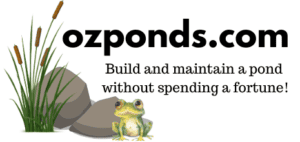Pond fish can easily survive 2 weeks or more without food. Overwinter they go months without eating.
If you design and keep a well balanced pond ecosystem you will never have to feed your fish. Unless you want to, of course.
That doesn’t mean they don’t eat! They will be like their wild counterparts and survive by hunting and foraging.
But if you want to feed your fish how often should you feed them?
How often should you feed your pond fish?
No more than twice a day! And no more than they can eat in 2 minutes.
Like I said you really don’t need to feed them at all. While your not feeding them they are still eating.
They are like cows! Always grazing.
They forage amongst the plants having a nibble here and there.
Down in the pebbles they are scrounging about looking for dead and decaying things they think are tasty.
Up at the surface they will swallow up any unlucky tiny insects that land in the water.
Mosquito larvae and tadpoles they’ll be eating!
I know, I know they always look so hungry when you come out and feed them. Crowding around like seagulls screaming mate!
Commercial fish food is like fast food to them. It’s quick! It’s easy! And it’s delicious. Everything in moderation.
No more than is eaten within 2 minutes! And no more than twice a day!
During cold snaps and winter don’t feed them at all. Their metabolism slows right down. Just like a hibernating bear. Let them chill….literally.
NOW if you are going to feed your pond fish be sure to give them the good stuff!
What types of food?
The type of food you’ll feed your fish will depend on the water temperature.
Fish are cold blooded so their bodies are the same temperature as the water they are living in. Therefore water temperature plays a huge role in how their bodies will metabolise food throughout the year.
High protein warm weather
A quality diet for your pond fish is high in protein. Not all proteins are created equal though.
Premium quality fish food will be high in protein (30% or higher). This protein should come predominantly from fish meal.
Avoid fish foods that use filler proteins derived from corn and soybeans. These manufactured proteins are harder for the fish to metabolise and can result in poorer water quality and fish health.
A premium fish food will not soil the water, and should provide your fish with all the essential minerals and vitamins. You should be rewarded with more vibrant fish colours.
Feeding fish regularly even with a premium fish food should only be done when the water temperatures within the pond are over 15C.
Temperatures lower than 15C and even cold temperature adapted fish, such as goldfish and koi will begin to slow down.
As their metabolism begins to slow what you feed them needs to change also.
Wheat based for cooler weather
In water temperatures between 10C and 15C you’ll want to feed your fish a more wheat based food.
As the water temperatures cool the fishes metabolism slows down the wheat germ (used in cold temperature food) becomes easier for their bodies to consume.
It’s important that the food they are eating is easily digestible as it allows them to get all the beneficial nutrients.
No food in winter
Once the water temperature dips below 10C it’s time to stop feeding all together!
I understand you want to and you worry about your fish, but you’ll do more harm than good.
If you are someone that likes to feed your fish, you should by a water proof thermometer so you can monitor the water temperature in the pond.
After winter as the fish start to become active again you can resume feeding the wheat based fish food. Remember between 10-15C.
Once the temperature is over 15C you can return to the premium food with high protein.
Feeding tips for healthy pond fish
- Most fish related problems are caused by poor water quality.
- Over feeding fish is a sure fire way to overwhelm your biological filtration and create poor water quality
- Poor quality fish foods are harder for fish to metabolise and can create water quality issues.
- Fish always act hungry! Don’t fall for it!
- Feed fish twice a day maximum.
- Only feed what they can eat in 2 minutes.
- Use high protein food (fish meal) when water temperature is over 15C.
- For temperatures between 10-15C use a wheat germ based food.
- In water temperatures below 10C don’t feed them at all!
Following these simple rules will allow you to feed your pond fish and maintain their health and the health of the pond.
Subscribe
We often receive special offers and discounts from pond product suppliers and distributors. We love passing on these discounts to our readers.
If you would like to save some money on pond products sign up to out mailing list. It’s that easy.
